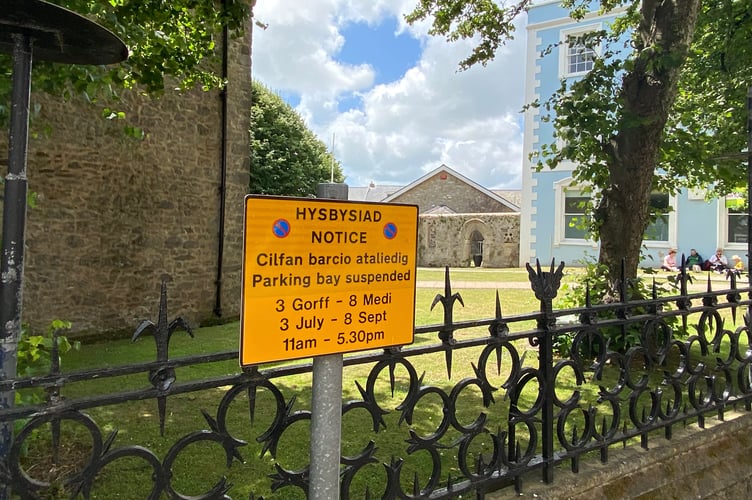More needs to be done in Tenby by the Local Authority to make it easier for those with disabilities to be able to park and access the seaside town, local councillors have stated.
Discussing a proposal for a disabled resident permit bay to be introduced at The Glebe, members of Tenby Town Council at their recent meeting went into a wider discussion about the issues those with disabilities and the elderly faced when trying to park at the resort.
Members examined the plan for The Glebe, with Cllr Sam Skyrme-Blackhall stating she felt it was a good move, as it was difficult for people with disabilities to park on their estates, with more bays needed.
“We all know what parking is like in Tenby, there just is not enough, and it is even more difficult for those with disabilities and the elderly,” she added.
Cllr Duncan Whitehurst seconded what his colleague had said, adding that he felt that this proposal for The Glebe was welcome.
He personally approved it and felt that the pilot scheme should continue. However, he felt that application forms were really long with ‘intrusive questioning’.
He said it was a rigorous procedure and he was aware that some who could have benefited from a similar scheme in their area had given up on it.
“I feel Pembrokeshire County Council need to look at how they could make it an easier process,” remarked Cllr Whitehurst.
Cllr Trevor Hallett pointed out, that sadly, a lot of Tenby was not designed for modern vehicles.
Deputy Mayor, Cllr Charles Dale said he had been told there were a distinct lack of disabled bays in the multi- storey car park.
Cllr Emma Lewis explained that, while there could always be more, there were a number of bays located adjacent to the lifts on every floor.

Cllr Laurence Blackhall commented that the walk from the 30-minute short stay disabled space to the Sainsburys store was twice as long as from the non-disabled space which is difficult for some. “Things could be better, but the scheme is rigorous,” he said.
Pembrokeshire County Council has come in for heavy criticism of late from some quarters and campaigners for not clamping down on obstructions such as A-Boards and tables and chairs blocking public pavements within the Walled Town, leaving many wheelchair and mobility scooter users frustrated.
“It is despicable that Pembrokeshire County Council and the Town Council continue to turn a blind-eye to this, especially as they are trying to paint a picture of Tenby reaching ‘dementia friendly’ status in recent years,” one person told the Observer recently.
Such obstructions, are also making the few dropped kerbs scattered around the town completely useless, the Observer was told, as they can’t be reached on many of the pavements that they are positioned on, due to the volume of advertising boards blocking the way.
“Such businesses that continually and recklessly put obstacles in the way of less able-bodied people, should be ashamed of themselves - but the Local Authorities are the ones that should really hang their head’s in shame, for ignoring the matter for so long,” one frustrated resident told the Observer.
Concerns voiced to Tenby’s county councillor for the North ward, Cllr Michael Williams prompted him to contact Pembrokeshire County Council’s streetcare manager Marc Owen and Cabinet Member for Residents' Services Cllr Rhys Sinnett, last month, to call for strong action to be taken.
“I have raised concerns about the obstruction caused by these boards and A-Frames over several years to no effect. As I understand the law these advertisements constitute the offence of obstruction. Please confirm that I am correct in this interpretation, and who might be legally liable for any accidents caused by these obstructions?” stated Cllr Williams in his correspondence.
“I was recently invited to accompany a wheelchair user to walk around the Town. Frankly this was something of an eyeopener, and the situation is extremely difficult for anyone who is restricted in this way.

“It also means that individuals have to walk on the highway to go around the numerous obstructions. This is dangerous, in particular if anyone has young children.
“Why has no action been taken to remove these obstructions given the obvious dangers, and many complaints over several years, and what action will be taken to address a growing problem? The numbers appear to grow every year.
“The situation is exasperated by the often dangerously uneven condition of footpaths in the town centre,” he added.
Even though the County Council’s pedestrianisation scheme starts in July, encompassing the school holidays, with many sections of the town, including High Street and Tudor Square traffic free between 11 am and 5.30 pm each day, it was highlighted to the Observer by one wheelchair user just how seriously dangerous it is to try and get around areas such as St Georges Street, Upper Frog Street and St Julian’s Street (which do not come under the traffic free zones during the PCC led pedestrianisation scheme) when indeed pedestrians are forced onto the roads due to the volume of A-Boards, chairs and tables fully obstructing pavements, with vehicles not excluded from these roads at any time during the scheme.
County councillor for the South ward, Cllr Sam Skyrme-Blackhall has conceded that the situation is getting worse, and has requested that the County Council’s Access Officer Jessica Hatchett visits the town to see for herself.
“The current situation is intolerable and needs to be resolved. Personally, I would like all A-Boards, signs and visual obstructions moved if they in any way impede peoples movement. We are not just talking about physical disabilities but hidden disabilities too,” remarked Cllr Skyrme-Blackhall.
“For many years, this situation has been managed by voluntary agreement and after my requests for action, another tour of all businesses was recently done by Council officers.
“However, I have not seen sufficient signs of improvement. If anything, the situation is getting worse. I have come to the conclusion, that voluntary agreements are not enough.
“If businesses are going to put anything out, they MUST leave sufficient space for a wheelchair and/or a buggy or pram to get past safely. Also, they must understand that they have a liability for what they put out. The law is clear.
“We need more ramps to safely come off curbs and these must not be obstructed. I also want to see time limits on scaffolding and it displayed when it is going to come down.
“We are a medieval town and access is difficult. But that is no excuse for obstructions making it harder still.

“I know businesses want to promote themselves but how about promoting our town as accessibility-friendly and removing these barriers,” she continued.
“I have asked the Access Officer for PCC to come and have a look and get a proper understanding of what it is like on the ground. I am assured that this is going to happen. But I am also calling for a letter to go to all businesses reminding them of their obligations and asking them to ensure accessibility is maintained. If not, there will have to be enforcement action and obstacles removed.
“Let’s face it, if someone dumped some old furniture the size of an A-Board in the middle of the road or pavement then it would be moved. Why is it not, just because it has advertising on it? It is time for people to take responsibility to sort this out.
“I have tried to get some of this work done quietly but I think we all need to realise that we need to be shouting more for those who struggle to get around,” she added.
When contacted by the Observer on the matter a spokesperson for Pembrokeshire County Council, said: “The Council recognises that obstructions to pavements can cause problems for all pavement users and especially those with visual or mobility impairments.
“We are sorry to hear of the experience of wheelchair users and following correspondence on this issue with Tenby County Councillors, Officers have attended the town to assess the situation.
“Businesses were visited and reminded of their responsibilities not to cause an obstruction (obstructing the footway is an offence under the Highways Act 1980).
“Following discussions, the majority of businesses were happy to remove the A-Frames to a more suitable position.
“We will continue to closely monitor the situation and if there are instances of obstruction which are a concern for those with visual or mobility impairment, we will look at taking enforcement action. Clearly, this is a last resort, and we hope all businesses will recognise the issues and work with us positively,” they added.




Comments
This article has no comments yet. Be the first to leave a comment.